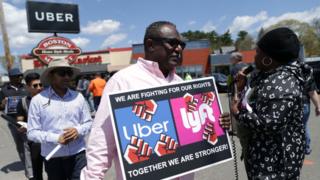California lawmakers have passed a bill that paves the way for gig economy workers to get holiday and sick pay.
Assembly Bill 5, as its known, will affect companies such as Uber and Lyft, which depend on those working in the gig economy.
Some estimates suggest costs for those firms would increase by 30% if they have to treat workers as employees.
But opponents of the bill say it will hurt those people who want to work flexible hours.
Assembly Bill 5 would put into law a decision by the state’s supreme court last year. Then, judges ruled that workers should be considered employees under state law if they are integral to a company’s business or it tells them what to do.
US democratic presidential hopefuls Elizabeth Warren, Bernie Sanders and Kamala Harris have all come out in support of the bill.
But Uber and Lyft have both proposed a referendum on the decision. In a statement after the bill was passed, Lyft said: “We are fully prepared to take this issue to the voters of California to preserve the freedom and access drivers and riders want and need.”
The business models of gig economy companies are already under strain – Uber lost more than $5bn in the last quarter alone. Some estimates suggest that having to treat workers as employees, rather than independent contractors, could increase costs by as much as 30%.
Uber and rival ridesharing service Lyft joined forces to push back again the bill. They suggested a guaranteed minimum wage of $21 per hour instead of the sweeping changes the bill would bring.
But that pledge wasn’t enough to sway California’s Senate, and the state’s governor Gavin Newsom is expected to soon sign the bill into law. That paves the way for California’s 1 million gig workers to gain added rights next year.
Source: bbc.com
 Home Of Ghana News Ghana News, Entertainment And More
Home Of Ghana News Ghana News, Entertainment And More





